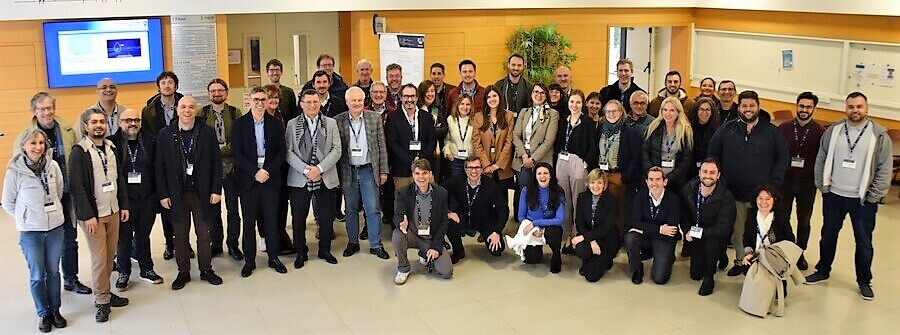
Ambitious European project to elucidate the genomics and epigenomics of lung cancer
More than twenty researchers from all over Europe, led by the Israel Institute of Technology (Technion), have partnered to carry out the LUCIA project, which seeks to improve the prevention and diagnosis of lung cancer, with a budget of €14 million from the EU’s Horizon Europe programme. A scientific team from the PCB community, led by Dr. Fran Supek at the Institute for Research in Biomedicine (IRB Barcelona), and Dr. Ivo Gut at the Centro Nacional de Análisis Genómico (CNAG-CRG), will contribute by analyzing the genomics and epigenomics behind the different risk factors and their contribution to disease.
With a five-year survival rate after diagnosis ranging from 5% to 25%, lung cancer is the deadliest type of cancer. Its detection at an early stage —in which more treatments are possible— improves the management of the disease and reduces the healthcare burden.
The LUCIA project intends to develop a toolbox to promote the early diagnosis of lung cancer across the general population. The toolbox is based on three complementary approaches.
First, the project proposes a non-invasive, low-cost procedure to assess the risk and screen for the disease in the general population. Second, precision screening is contemplated in a clinical setting for high-risk populations; these high-risk individuals may be defined by exposures (e.g. pollution) or by their genetics (heritable risk). Third, for those for whom screening points to high risk, a complete analysis for cancer diagnosis is considered.
Genomic scoring as a fundamental pillar for risk assessment
A team from the Genome Data Science laboratory, led by ICREA researcher Dr. Fran Supek at the Institute for Research in Biomedicine (IRB Barcelona), and the Biomedical Genomics Laboratory of CNAG-CRG, led by the director of the center Dr. Ivo Gut, will work on a risk prediction factor, namely, the polygenic risk score, which will be based on the sequences of individuals’ genomes using blood samples. To build the predictive algorithms, the researchers will sequence and analyse thousands of healthy individuals and cancer patients’ genomes through whole genome sequencing, complemented by epigenetic data collection by whole methylome sequencing. The genetic component will be complemented by other non-invasive techniques, such as analysis of the chemical composition of a person’s breath or sweat, thereby providing a global score of lung cancer risk.
Besides the few genes known to be involved in lung cancer (such as KRAS), whole genome sequencing and computational analysis will allow the scientists to estimate the contribution of a wide variety of genes that may have only a subtle impact individually but that together may add up to a significant impact. In addition to the genetic score, the researchers will also work on the epigenetic score, which will estimate the contribution to the disease of environmental variables that affect gene regulation.
“This approach is innovative in cancer risk prediction. We suspect that, in addition to known exposure risk factors such as pollution and smoking, there are other unknown but relevant exposures that may reflect in the epigenome-wide patterns. In addition to these factors, there is potentially a non-negligible inheritability in lung cancer risk, and that’s what we will appraise,” explains Dr. Supek.
“Lung cancer is a very complicated form of cancer and very challenging to manage because of its heterogeneity. LUCIA is a forward-looking project that will shine some light on this complexity — genomic and otherwise — and ultimately help healthcare professionals understand the risk factors underlying and causes of lung cancer, thus improving cost-effectiveness and saving patients’ lives,” says Dr. Gut.
Spain is among the main contributor countries
Spain has a strong presence in this international project, with 9 out of 22 partners based in the country. Among the Spanish partners are representatives from the public health system, biotech companies, and research centres from Catalonia, the Basque Country, Andalucia and Madrid. In particular, IRB Barcelona and CNAG-CRG are accompanied by the following partners: the Fundación Centro de Tecnología de Interacción Visual y Comunicaciones Vicomtech; the Universidad Politécnica de Madrid; Bilbomatica S.A.; the Servicio Andaluz de Salud; the Fundación Pública Andaluza para la Investigación en Salud en Sevilla; the hospital Biocruces Bizkaia; and the Servicio Vasco de Salud Osakidetza.
The Genome Data Science lab at IRB Barcelona has been allocated €1.4M to work on the project over the next four years. This funding will allow hiring of three new staff members, the sequencing of thousands of blood samples to determine their genomes and epigenomes, and the undertaking of experimental analysis to model cancer development in cell culture models. The Biomedical Genomics group at CNAG-CRG will receive more than €360,000 for sample sequencing and research and hiring a person with a computational profile.
» More information: CNAG website [+] and IRB Barcelona website [+]




